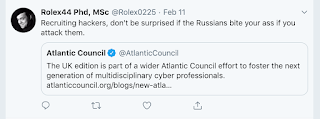 |
| Photo Credit: Shutterstock.com |
When someone on Twitter challenges what you wrote, who are they? Is it dialogue or conflict? Are they real…a bot…a troll?
Who’s the other guy on Twitter?
Who’s the other guy on Twitter?
I posted a comment on Twitter About an article in Riddle by Vladislav Inozemtsev entitled “The Russian Economy’s Non-Stop Inertia” that painted a dismal picture of Russia’s economic prospects.
In a brief exchange, Rolex44 (@Rolex0225) finally tweeted what I took as an admission that he was Russian--otherwise, his going on about the Russian economy (and the US) would be inconsistent with what he tweeted.
When I pointed out the admission, he shot back with this.
And, indeed, Rolex44 (@Rolex0225)’s Twitter header prominently displays a billowing British flag.
That piqued my curiosity. Who was Rolex44 (@Rolex0225)?
There were problems with his profile and his claim to be British. You would expect a British PhD to know how to capitalize that abbreviation. He didn’t. Also, some of the syntax in his posts was wrong, which suggested he was not a native English speaker. Careless? And, why a picture of an American actor; did Orson Welles’ manner and midwestern accent mislead Rolex44 (@Rolex0225) to think the actor was English? Careless again?
Rolex44 (@Rolex0225)'s Twitter profile didn’t include any verifiable information. But there were clues.
He has on Twitter a respectable following of 436 people, but apparently no digital presence on other social media. But the composition of his followers is striking. It includes Sputnik--a Russian propaganda site--, anti-Jewish polemists and the likes of @Syricide, who rages against “blood spitting Russophobia”.
He follows 882 others himself. Who are they? Well, the Russian Embassy UK, the Russian Mission UN, President of Venezuela Nicolas Maduro, and a host of anti-Western actors and extremists of the left and right; as well as a few Manchester sports accounts and cryptocurrency sites.
His own tweets—or retweets mostly—are stridently anti-Western (and pro-Russian), especially anti-US. He is keenly aware of US political events, from what Congresswoman Ilhan Omar last said to what is happening with Trump’s border wall.
There is not much, though, about Manchester and nothing about major Manchester sports moments, despite his following the Manchester sports accounts.
Here are two characteristic examples of times he posted his own comments.

Rolex44 (@Rolex0225)’s twitter header above says he joined in July 2014, but a check in 2014 shows he had a related account back to 2010. On the right is what Rolex44 looked like back then (before he became @Rolex0225).
Adrian’s activities match the later Rolex44 (@Rolex0225), i.e., very few original posts and countless retweets of anti-Western and extremist nonsense. At the same time, an internet search produces no obvious evidence of an Adrian Clift of Manchester, England.
A reverse image search produces no hits for Manchester but an apparent match from Yandex, a Russian social platform similar to Facebook.
 |
 |
| Yandex |
On any day Rolex44 may retweet dozens of hate messages. Twtrend.com (Right) shows that from July 2014 to present, Rolex44 averaged about 30 retweets a day.
Rolex44’s lack of digital presence other than Twitter and his energic retweeting marks him as fake. His true purpose is evident from his prolific retweeting of hate messages expressed by others on the internet. His other interests are peripheral to this purpose, which is clear from how little effort he puts into those other interests.
The range of hate messages he retweets is broad but highly focused on US politics and social issues, Ukraine, Middle East conflict (often anti-Israel), and pro-Russian news, etc—but rarely directly related to who he claims to be, which suggests that his purpose is to aggravate hate by inciting others to overreact. In rare bursts of comment on retweets, he is combative, abrasive and dismissive, consistent with the whole tone of his twitter feed.
I can’t know with certainty that a certain Adrian Clift of Manchester, England, does not exist, but I can draw reasonable conclusions from what I do know about Rolex44. He is a troll, and likely Russian. His tweets are meant to enrage and divide.
However, trolls don’t have to own the internet.
The internet amplifies lies, but it also calls them out.
When someone posts strident nonsense or hate messages, don’t leave their views unchallenged. A troll may attempt to spread their hate message by piggybacking on your post, thereby gaining access to your audience. However, if you provide a factual, responsible response, they can’t respond in turn without retweeting your message as well. A sensible reader can distinguish sound, compelling arguments and sort out the nonsense if they have all the information, not just the troll's point of view. Take this advice from another Twitter user, @yarkot, on how to respond to trolls,
1. Start with the truth (if you lead with the lie, you privilege it)
2. Note attempt to divert the truth (note, rather than amplify, the lie)
3. Return to the truth the lie is designed to hide (don’t allow the distraction/diversion to work)
Here’s my original post.





